Kryvyi Rih finds itself under fire every day – explosions, debris, and air raids have long become commonplace here. Local journalists live and work in this reality. Without armored cars and security, but with a deep understanding of their duty: to tell people the truth, to stay in touch in the most difficult moments.
They do not leave. They stay. To be there, to record tragedies, and to find words of support for their fellow countrymen. This work is not about heroism but about endurance. About the daily silence after the explosions, in which someone continues to write. Support for the injured journalists of Kryvyi Rih – in particular, protective equipment, emergency mini-grants, and psychological support – is provided by the National Union of Journalists of Ukraine (NUJU) through the Journalists’ Solidarity Center (JSC) in the city of Dnipro, which operates with the help of international partners.
Although journalists from the capital and abroad come to Kryvyi Rih to cover important events, prompt reporting on events in this important city of the Dnieper region is almost entirely the responsibility of local media.
“We visited Kryvyi Rih on the day when foreign diplomats were commemorating those who died as a result of the barbaric russian shelling,” told NUJU journalist Oleksandr Pavlov, who accompanies the France 5 Televisions film crew as a local producer. “Apart from us, we did not meet a single foreign journalist that day.”
Recently, the city has experienced a series of powerful missile strikes. The most terrible one occurred on April 4 – an Iskander-M missile hit a playground near high-rise buildings in a residential area. Twenty people were killed, including nine children. For journalists, this was not just a topic for reporting – for many, it was a tragedy that happened near their homes.
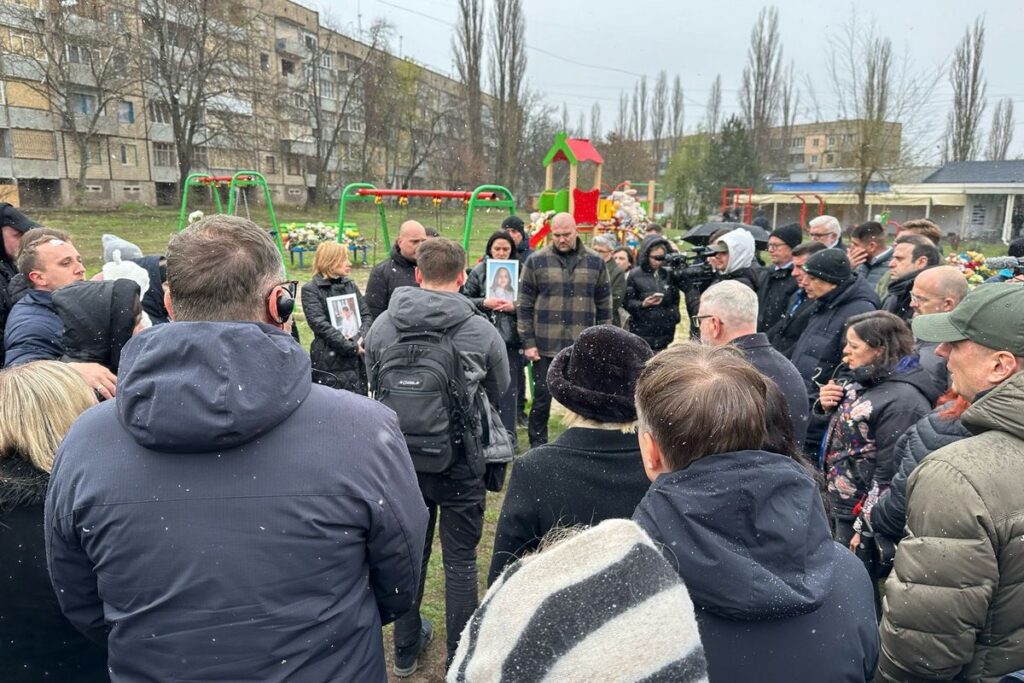
“We understood immediately that a tragedy had happened”
That day, the children of the NUJU member Kateryna Velychko, who moved to Kryvyi Rih from Sloviyansk with her family, had just come home from extracurricular activities. They had not even had a chance to wash their hands when a message about a ballistic threat came in. They wanted to go to the vestibule, but they were too late. About two minutes passed when a terrible explosion occurred. The door to the balcony, which overlooks the opposite side of the explosion, flew open.
“Fear literally carried us into the vestibule, two walls away from the outside world. My neighbor, who lives in an apartment with windows facing the explosion, also ran out there. We went to her apartment and saw a terrible cloud of smoke,” says Kateryna. “We immediately understood that a tragedy had happened because we could hear screams, crying, and ambulance sirens. Thoughts flooded in – it’s just a miracle that we’re alive… The enemy chose a time to strike when people were leaving work; mothers were walking with their children outside… Rush hour… And as soon as we started to come to our senses, the Shahed drones came flying in. And we’re hiding in the vestibule again.
For Kateryna, being under threat of death is not the first time. When we lived in Sloviyansk, during the attack, we barely had time to run into the entrance when there was a bang outside. The iron door took the brunt of the blow.
“When we, having survived the shelling during the Sloviyansk occupation, settled in Kryvyi Rih, we sighed with relief,” recalls Kateryna. “It seemed that our district was one of the safest here. It “hit” some area, now here, now there, but I reassured my loved ones that it was far away. And, so April 4 came to us – and with extremely serious consequences….”
“When I “witness the explosions,” the journalist in me recedes into the background”
Editor of the online media 0564.ua, Svitlana Romanenko, talks about the emotional exhaustion that journalists face, working in conditions of constant danger.
“I thought that I was protected from emotional exhaustion by a realistic perception of reality… Yes, long before the start of the full-scale invasion, I understood that it was inevitable, and I was internally preparing for it,” says Svitlana. “But the exhaustion still makes itself felt. It makes itself felt through thoughts about how much longer I can endure it, what will happen next… and right now, I would like to be left without information for a week or not communicate with anyone at all.”
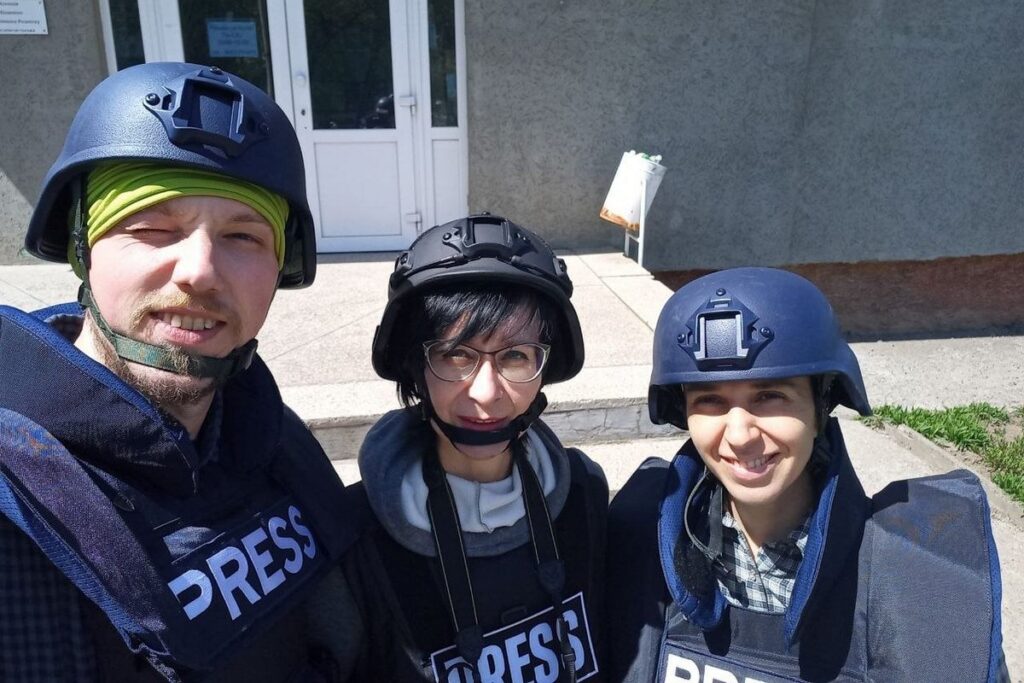
There is no peace for Kryvyi Rih journalists either at work or at home. On the night of June 22, 2023, a russian Kinzhal missile hit the middle of the street where Svitlana Romanenko lives.
“Miraculously, no one was injured. But the houses were badly damaged, and there is a huge crater in the middle of the street,” Svitlana said at the time. “A piece of asphalt concrete flew into our house and pierced the roof and ceiling; it’s good that it fell in the kitchen, not in the bedroom. The slate was broken, everything outside was damaged, the plants, the garden – everything was littered with pieces. Just yesterday, I was admiring the beauty of the rose season, and today everything is shattered….”
It is also difficult for those who travel to the sites of shelling and work with the victims.
“When I “get to the arrivals” and people need help, the journalist in me recedes into the background. You take a person by the hand, try to calm them down, help them, give them advice… And only then do you start preparing the material,” says the journalist.
Editor-in-chief of the online media, Expert-KR, Olha Honchar (Khvostova), also notes that the problem of psychological exhaustion remains unresolved.

“To be honest, I can’t say that I manage to overcome these psychological problems. Because in order to overcome these problems caused by full-scale russian aggression, you need to devote enough time, effort, and money to it. And all these resources are now in terrible shortage,” states Olha.
According to a journalist of the online media, Pershyi Kryvyi Rih, Olena Smolina, the biggest challenge of war is unpredictability and constant fear.
“Unpredictability, probably, because it is difficult to plan your future even for a short period. That is, you plan your work, and then everything goes awry because of these missile and drone attacks, and it’s scary. And the shelling happens at night; you have to wake up, quickly calm the children, and write news at any time of the day,” explains Olena.
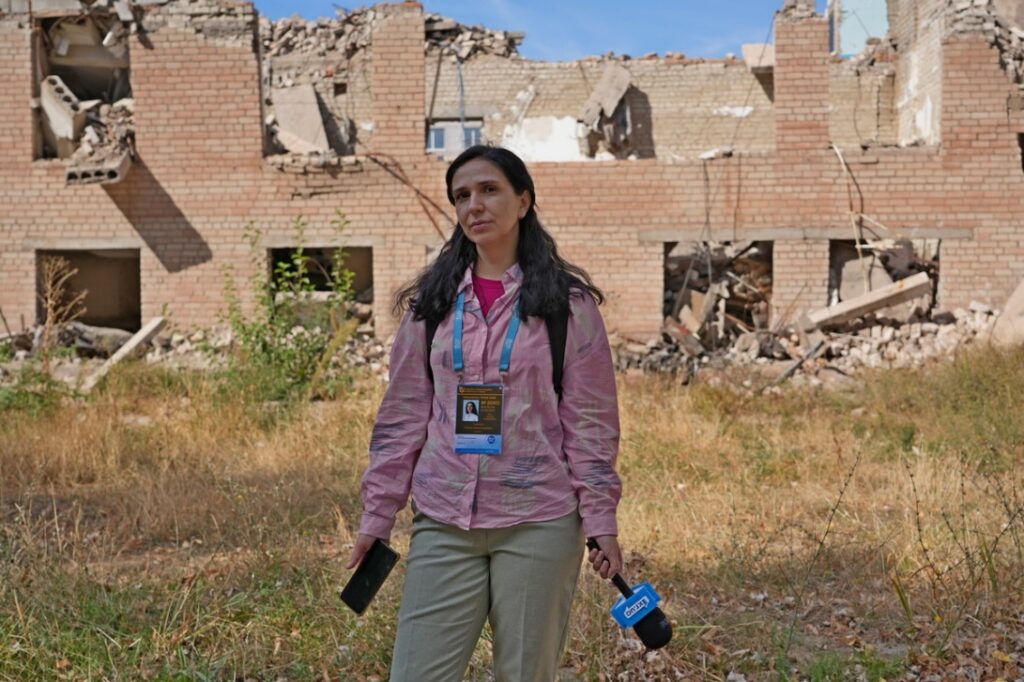
On March 29, a missile hit a furniture warehouse opposite the house where the journalist lives.
“I heard an explosion, went to look on the balcony, and saw that my windows had fallen out again. For the second time in a while,” says the journalist.
The cases with the housing of Svitlana Romanenko and Olena Smolina are not isolated. Only during the attacks at the end of March, the housing of the famous photojournalist Serhii Divieiev and TV journalist Dmytro Moskalenko was damaged. And the house of the journalist of Nashe Misto [Our City], Andrii Fedchenko, needs major repairs.
“Economic factors “shot” at the media”
Economic difficulties are another serious challenge for the Kryvyi Rih media. Many newsrooms were forced to close their print versions and go online, reduce staff, or cease operations altogether.
“Economic factors were primarily responsible for the media, and, unfortunately, many publications were closed. Among them is the city newspaper Chervonyi Hirnyk,” says Tetiana Babenko, the head of the Kryvyi Rih organization of the NUJU.
The corporate newspaper, Metalurh, which Tetiana herself heads, also experienced difficult times.
“The last printed issue of our newspaper was published on the very day the war began,” she recalls. “Further publication of the newspaper immediately, of course, became impossible: the enemy stood very close to the city for some time. Enterprises stood up, and publications, as a rule, depend on advertisers and owners.”
Despite all the difficulties, the publication Metalurh found an opportunity to continue its work. Initially, the newspaper switched to an online format. It recently resumed its print version – for the first time in more than three years of full-scale war.
“People like the paper format – a newspaper that you can hold in your hands, bring home, and keep some issues with your family. We really asked the owner, the company ArcelorMittal Kryvyi Rih (until 2005 –Kryvorizhstal), and this year we were allocated funds. Now, we will have issues once every two weeks! Of course, if we had a circulation of 20,000, then now it is 5,000, but we understand – many people left,” explains Tetiana Babenko.
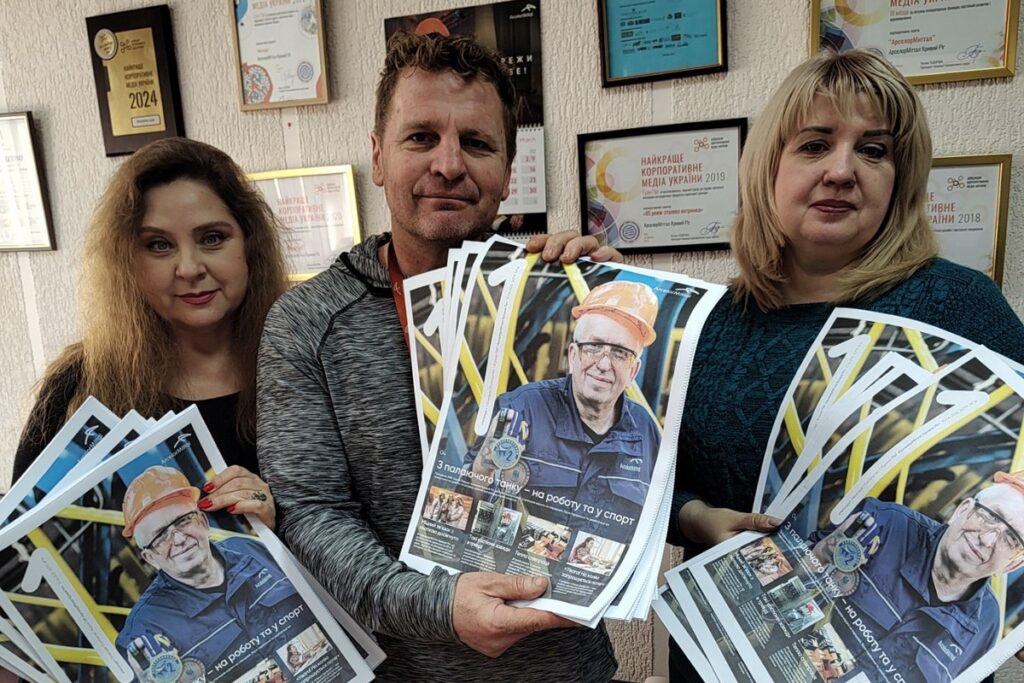
Some publications survive thanks to international support. “We are a media outlet that has an institutional grant from the National Endowment for Democracy, which is an American fund,” explains the editor-in-chief of the publication Expert-KR, Olha Honchar. “But… the funding was suspended. We had to, in fact, release all the people and continue to cooperate with them on a volunteer basis.”
What the Kryvyi Rih media write about
However, journalists from Kryvyi Rih have not folded their hands and pens. Among the topics that interest the townspeople the most, the journalists name the consequences of the shelling, the issues of the city’s life support, in particular problems with heating, water supply, and public transport.
“Judging by the number of views, people are interested, of course, in the consequences of explosions caused by russian attacks. This worries everyone; it has a wide reach. Also, articles related to crime, investigations, and various road accidents traditionally have a wide reach,” says Olha Honchar. “That is, as always and everywhere.”
“Yes, the audience is interested in the consequences of explosions, security, and everything related to some household items,” agrees Olena Smolina. “People love to read about how trams are running, where the route is being changed due to repair work, or where there will be no water in Kryvyi Rih, or what concerns heating.”
Despite all the tragedy of the war, journalists also find positive stories that help both themselves and their readers endure the trials. Svitlana Romanenko talks about her meeting with Liubov Yukhymenko, a mother of many children whose sons serve in the Armed Forces of Ukraine.
“Her phone was lying with me for a long time – I just didn’t have time to take up this story. And then one day, after hard, monotonous work (journalists have such periods) and emotional burnout, I remembered that woman. I called the village council – and they told me that she worked as a milkmaid until her retirement and that all seven of her sons serve (she has 11 children in total)! Everyone has golden hands, everyone treats their mother with great respect – and everyone went to serve.
Svitlana asked if she had ever dissuaded her children from service, to which she replied: “All my boys have character! And my job is to support them.”
“When you work with such a person, you are inspired. It affects me… such stories. I like to write what I think should be instructive for others, and this story supported me…,” Svitlana says.
The main article of the first issue of the restored newspaper Metalurh is also dedicated to the unusual story of a person who went through the war.
“This is a story about an employee of the enterprise Serhii Paietsyk, who went through the war, was demobilized due to disability, but continues to defend Ukraine in sports – at the Invictus Games,” says Tetiana Babenko.
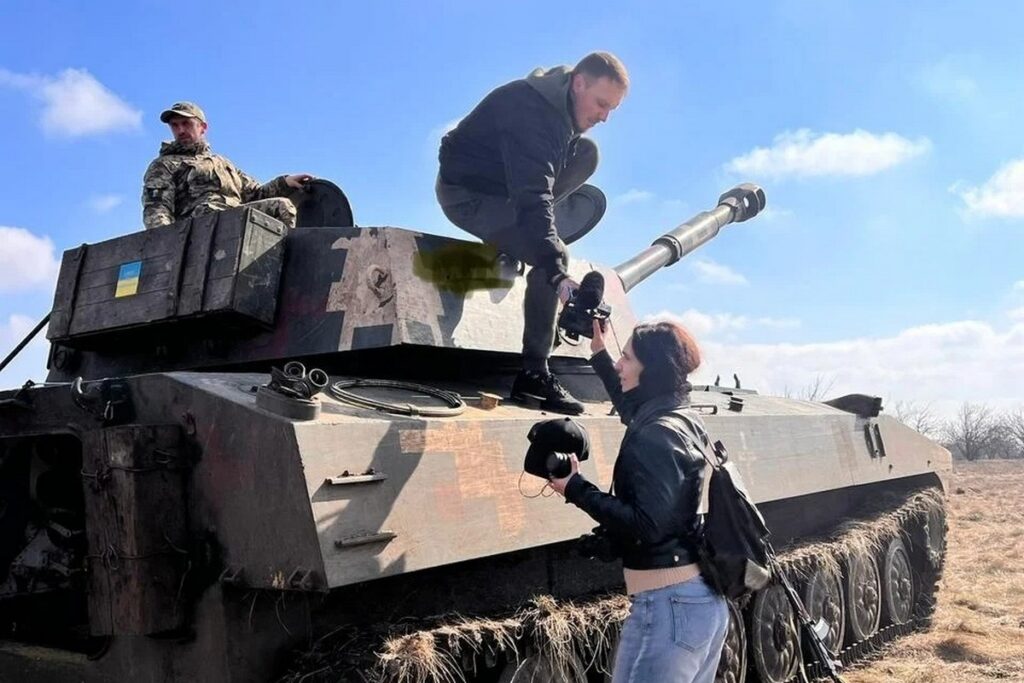
The journalists of Kryvyi Rih, like their heroes, also find the strength to pull themselves together and live on.
“Having survived the shelling, we conducted a “briefing” with the children on how to behave in times of danger… We honored the memory of the dead…,” says Kateryna Velychko. “But the other day, I was walking through that unfortunate yard that survived the russian strikes – and I see that there, among the flowers and toys that people brought in memory of the dead, mothers with children in strollers are walking again. Life goes on.”
Kryvyi Rih is one of the largest industrial cities in Ukraine, the heart of the metallurgical industry, located near the front. Almost half a million people live here. The city has repeatedly become a target for russian missile attacks but continues to live, work, and resist.
It is here that journalists work, risking their lives every day to be at the scene of events, to be the first to see the consequences of the shelling, and to talk to those who survived. These are not large newsrooms with world budgets. These are local publications, reporters, editors, and cameramen who did not choose safe evacuation. They stayed to be the voice of their city in the darkest days. To tell the world not only about the destruction but also about the strength, humanity and dignity that cannot be broken even by missiles.
The NUJU supports the media community of Kryvyi Rih and other front-line cities. Through the JSC, we provide protective equipment, emergency mini-grants, legal advice, psychological support, and a space for safe work.
Journalism in Ukraine is not only about news…
Maksym Stepanov
NUJU Information Service

 THE NATIONAL UNION OF
JOURNALISTS OF UKRAINE
THE NATIONAL UNION OF
JOURNALISTS OF UKRAINE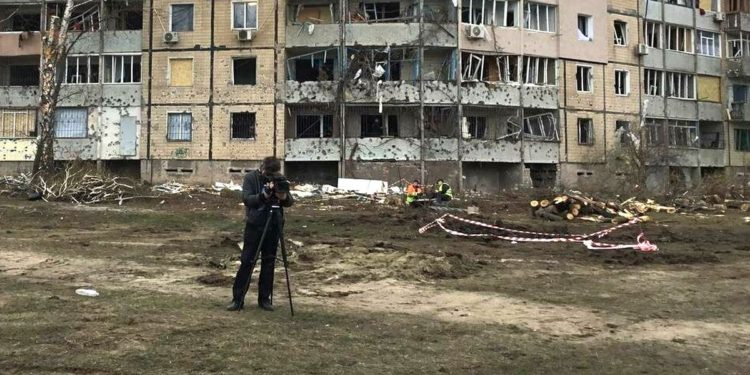
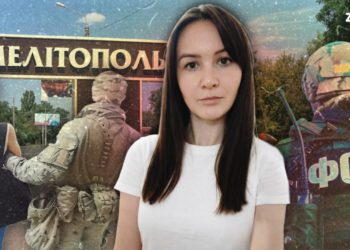

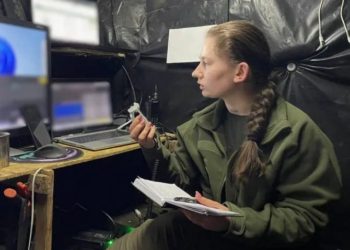













Discussion about this post